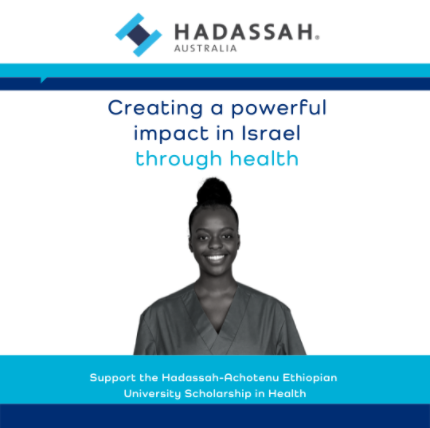
Hadassah Australia’s commitment to assist young Ethiopian-Israelis enter Israel’s health system was ‘front and centre’ with the graduation of the first cohort of twelve Achotenu students in June.
The Achotenu program was created to enable young people from marginalised communities to join the helping professions. It was particularly focused on students who found difficulty navigating Israel’s university entrance psychometric exam.
The first graduating class are nurses who were awarded a place in the Hadassah-Achotenu Ethiopian University Scholarships in Health program. Later scholarship recipients also include occupational therapists. This is also a much-needed group in the overall architecture of Israel’s over-stretched health system.
Successful students enrol in the Henrietta Szold Hadassah-Hebrew University School of Nursing after completing the Mechinah preparatory year which helps set them up for the demanding university years.
The scholarship covers the cost of tuition, living expenses and tutoring.
Well before COVID-19 hit Israel putting enormous strain on the country’s health services, Hadassah Australia was deeply involved in creating a pathway for these students.
“Nursing and occupational therapy are professions of choice for the Ethiopian community in Israel,” says Ruth Rosen, Executive Director of Hadassah Australia.
“Young Ethiopian-Israelis were struggling to find a way to enter the health system, and that system was struggling to find people to join it. The OECD pointed to that with an alarming statistic – Israel desperately needed 1,000 more nurses if it wanted to rise from being close to the bottom on the nurse-to-patient ratio.
“It was a wake-up call that Israel could not ignore, and Hadassah Australia was up for the challenge.”
Where there is a need for funding, Hadassah Australia will find a way
Ms Rosen said Hadassah Australia has been an active funder of many important health initiatives in Israel. This was time-sensitive and the organisation went into overdrive to secure funding for this critically-important initiative.
We have now moved in to the second round of funding for Cohort 5, who will graduate in 2024.
It’s important to continue funding this program and we are indebted to the individuals and organisations that have thrown their support behind the Hadassah-Achotenu Ethiopian University Scholarships in Health.
To understand how important this program is, we spoke to two of the graduating students.
Reut’s* story is typical of the young men and women who are among the first children in the post-aliyah Ethiopian-Israeli community to go to university.
Reut’s difficulty with Hebrew meant that she was destined to fail the standard psychometric test that is required of every student prior to university entrance.
“Without the Achotenu scholarship I wouldn’t be where I am today,” she said, after graduating in June. “It meant we could concentrate on learning without worrying about how we were going to pay for our studies. I am eternally grateful to those who made it possible for me”.
Shira* was born in Israel to parents who made aliyah during Operation Solomon in 1991. Her mother passed away during her schooling, so as the oldest child Shira had to look after the home as well as take care of her brother and sister. Her schoolwork suffered and her dream of a career in health seemed all but over.
“After my army service I decided to go to university, but I couldn’t pass the psychometric exam. I found the Achotenu program and to my great relief I was accepted into the occupational therapy program,” she told Hadassah Australia.
“It’s hard to describe what it means for me and my family. I feel I am contributing something important and worthwhile to Israel which gave us a home and a future.”
Hadassah Australia president, Ron Finkel AM, hosted an online panel in mid-May that brought together the beneficiaries of the program with academics and healthcare experts.
COVID-19 shed a light on the desperate need for healthcare workers
The students who participated in the panel represent the hopes and dreams of a marginalised community that for millennia kept their faith alive in Ethiopia against almost insurmountable odds.
Among the healthcare experts to join the panel was Dr Rely Alon, Director of Nursing at Hadassah. She said that Israel entered the COVID era under-resourced as far as nurses were concerned, but the real threat was in the ICU where the need for highly-trained and specialised nurses was most acute.
“Hadassah not only dealt with the most number of COVID patients, more than 4500, but we also taught nurses from other hospitals how to treat these patients,” she said.
“We perhaps more than any other hospital in Israel understood what the implications were for having too few nurses in a pandemic.
“If it wasn’t for the foresight of the Hebrew University, the Hadassah organisation and the management of the Achotenu program, I would hate to think what the health infrastructure in our country will look like.”
Hadassah Australia is indebted to all the donors including the Orah Foundation, The Skyled Foundation, The Jack & Robert Smorgon Families Foundation, the Erdi Foundation, Judy Avisar, Shanit & Michael Borsky, Elchanan & Hava Januszewicz, Josh Liberman, Dr Joseph Reich AM, and in memory of Zofia and Michael Fridman.
*Names changed for privacy